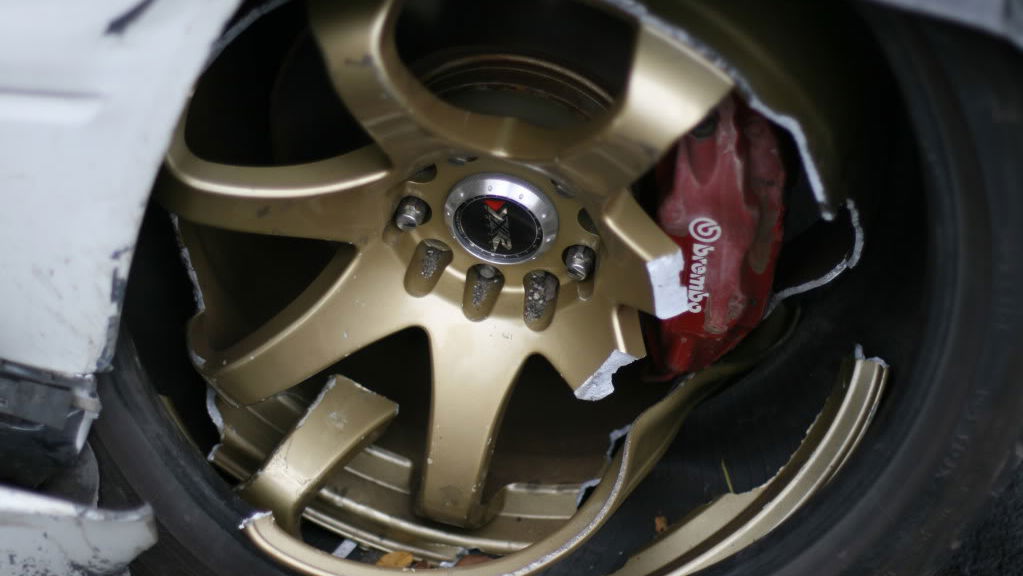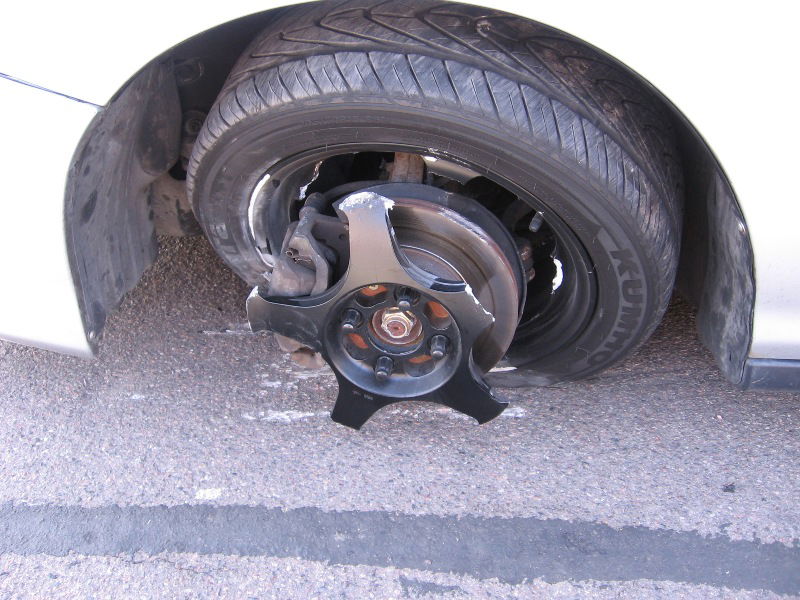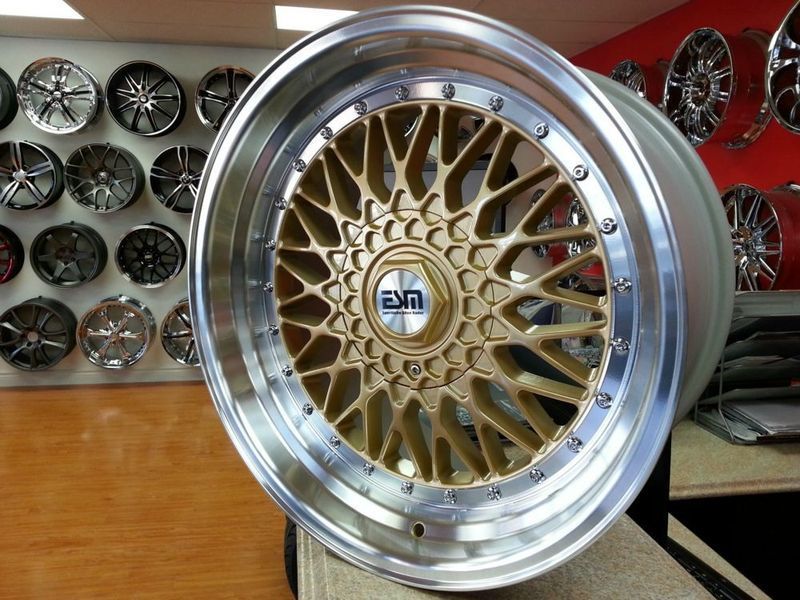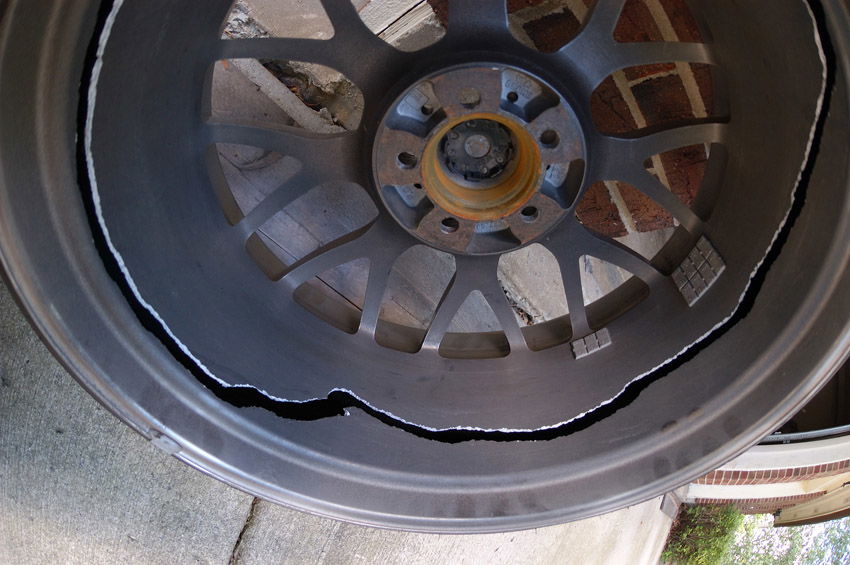Why Fake Wheels Can Be Potentially Dangerous

Replica wheels will forever be a tempting option for the budding car modifier, considering the huge cost of purchasing a full set of high-end rims. Replica wheels can be found for as little as £70 online, making them a mouth-watering prospect if they look the part and would give your car a whole new look.
But there are inherent dangers involved within the manufacture of these cut-price rims, so be extremely wary of any ‘too good to be true’ deals floating around Internet auction sites or a Craigslist equivalent. So what makes them so much of a risk?
Unfortunately, many replica wheel manufacturers are in the business to make the cheapest wheels in bulk and as quickly as possible. This means that they skip many processes that proper wheel manufacturers implement to ensure safety, durability and performance at all times. This is because the equipment and time needed to perform the thorough testing and in-depth, quality manufacture cost a serious amount of money - money that the ‘OEM style’ producers usually decide isn’t worth spending.
The biggest factor that makes replica wheels a genuine danger is the manufacturing method used to quickly produce the wheels. Gravity casting is often used, which is the process of pouring molten metal into a ready-made cast and simply leaving it to set as it cools down. The wheel is then popped out of the cast once it has solidified and tidied up using skimming drill bits to get rid of any unwanted excess metal.

In the manufacture of proper OEM forged wheels, an air pressure is applied to the molten metal as it enters the casting, compressing the metal and forcing the wheel’s overall density to increase. This gives it an inherent strength and durability against whatever you can throw at it during a lifetime of driving. Gravity casting on the other hand leaves the wheel material full of irregular areas of density, therefore lacking the tensile, torsional or compressive strength to stay within the safety factor of their properly manufactured equivalents.
In addition to poor manufacturing, replica wheels will encounter little to no proper physical testing that will validate the design as a viable option for your car. Companies like BBS and BC put each wheel design through the following intense set of tests:
• Dynamic fatigue testing (simulating normal road driving) where the wheel is placed under load, with sensors showing how it deals with the forces and torques created by the contact with the road
• Cornering testing, where the wheel is spun horizontally to test its effectiveness with dealing with lateral loading
• Impact testing, where a sudden load is applied to the rim of the wheel to test its strength against possible pothole or kerb impacts
The professional wheel manufacturers will not go forward with a wheel design unless it meets certain criteria within these tests, ensuring large safety factors within each wheel so that they have multiple lifetime guarantees engineered into each part of the wheel. On the other hand, the faked copies are pumped out in huge numbers with nowhere near the same research and development going into each wheel, leading to many possible – and justified – safety concerns.
Due to the replica wheels being made up of much more porous material, they are much more susceptible to cracking and in extreme cases completely shattering when they are confronted by heavy impacts and large torque inputs – forces that the OEM wheels are engineered to deal with. With spokes and wheel rims becoming natural focal points for stress and strain on the wheel, fake wheels have been known to completely sheer sections of wheel rim and multiple spokes due to a complete lack of strength within the material.

The finish and durability of a replica wheel will also potentially be poor in comparison to an OEM wheel. Proper wheel manufacturers apply protective coatings and resins to their wheels to protect them from moisture, dirt and pesky stone chips. Not only does this finishing touch protect the wheel from unwanted corrosion and damage, it will also keep your rims looking as fresh as the day they left the factory after a good clean.
Replicas are more inclined to have a fake ‘polished’ finish which will look great for a certain amount of time before chipping away and leaving a horribly irregular coverage of whatever coating was cheaply applied.

The choice between fake and replica wheels in comparison to the more expensive OEM equivalent should all come down to safety, and the assurance of it from the supplier. If you do decide to go for a cheaper replica wheel, make sure that it comes with documentation stating that it has passed the relevant tests and has had the required coatings applied to it before being put on the shelf.
Fake wheels have been known to shatter under hard braking, cornering or even at motorway speeds, creating potentially lethal results due to the skimping of extremely important manufacturing methods. So we recommend you pay for quality.
Have you bought replicas wheels before? Have they been durable or a complete catastrophe? Comment with your experiences below!

Comments
How about Rota?
Yes,they make replicas,but they’re a well-known and quite big brand,and Phil wears them too!
So,are those unsafe too?
Anyone with actual data to back this statement up,or o negate it?
(Riceing Intesifies)
[DELETED]
Fake bbs make the baby Jesus cry
Moral of the story: Get BBS not B.S
For God’s sake… Replicas and Fakes are NOT THE SAME THING!
Replicas immitate the main points of the original design.
Fakes are pure knockoffs built by child labour somewhere in btfk nowhere.
The fakes can be dangerous, but the replicas are usually safe.
For more info, read from a page that actually knows what the hell they’re talking about. CT, you’ve let your whole original fanbase down.
http://www.stanceiseverything.com/2015/04/dont-believe-the-hype-the-wheel-debate-isnt-black-and-white/
A decade ago, I used to have replica MUGEN MF10L wheels on my EG 3-door Civic. One time I understeered from overspeeding the rain and ended up curbing the wheel. The barrel of the rim broke apart from the spokes and lodged itself in the wheelwell… What a waste of money and time…
You can by wheels made to Regulatory standards. You don’t have to buy OEM,
Now time to look into some VOLK wheels
And what do you do when you own an F10 5 series and you bend your OEM wheels easy in pot holes?
Get a ford model t problem solved
Pagination